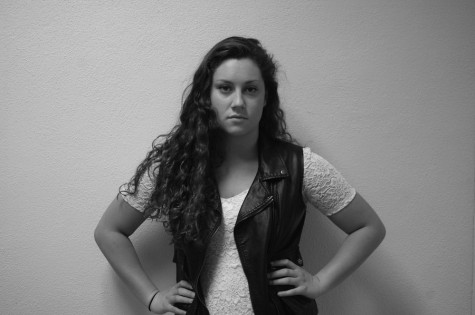Silent Struggle
Homeless teenagers struggle to balance academics and daily need for shelter
February 28, 2015
Jane’s mother gave her up at a young age, and she had to grow up quickly. If you ask her about it she’ll tell you it’s shaped her identity and made her stronger at the end of the day. Her family and her living situation are just her reality.
Jane, whose name has been changed to protect her identity, was homeless for two years. This winter, she rented her first apartment. For her, homelessness consisted of spending nights with various friends and family members.
“People probably do know that there’s homeless people, but they don’t recognize it because it’s not something you can always see. Homelessness can be different for everybody; some for the worse, some not,” Jane said.
At Park, 30 students have disclosed to counselors they are homeless or highly mobile. Once students move to two different schools in one academic school year, they are classified as highly mobile. Counselor Heidi Cosgrove said this number may be even higher.
Despite this, Cosgrove said most of the student body does not recognize the problem.
According to Jane, the lack of recognition stems from the taboo surrounding the topic of homelessness.
“It’s something that should be recognized but you don’t want to be like ‘oh are they homeless?’ It’s not something you’re going to typically look for,” Jane said.
The Wilder Organization conducted a survey in 2012 and found that 46 percent of all homeless individuals are under the age of 21.
The high school utilizes many resources to assist students struggling with lack of reliable shelter, according to high school counselor Heidi Cosgrove.
Cosgrove said the school is able to help with transportation and nutritional needs. By noting students in the school system as homeless or highly mobile, they are able to receive free and reduced meal options. Additionally, depending on their location, they can receive bus transportation pickup or bus cards.
Despite the struggles associated with her living situation, Jane said she has made sure school remained one of her biggest priorities.
“For me, school is a big thing because I’ll be the first out of my mom’s kids to graduate high school,” Jane said. “My two older siblings didn’t graduate, so for me to come to school everyday or for me to come to school trying is really a big thing.”
Jane said she plans to continue her education at Normandale or another local community college to obtain her two-year degree before transferring to a university to complete her four-year degree.
“I definitely want to take my life to the next step. I’m hoping that I can get into college and like college and want to keep going with college, because it’s a new life out there,” Jane said.
Jane said high school counselor Laura King has been providing her with academic support as well as setting her up with resources to take care of personal needs since she became homeless two years ago.
“The school gave me a student bus pass to get to school on the city bus and that helped a lot because they’re quarterly passes. That’s a few months to get around and get to work. Whenever I needed pads (and other feminine products) or extra toothbrushes, having the resources to get all of that stuff helped,” Jane said. “Being able to have effective counseling with Ms. King is so helpful in a world like today; going through all of this stuff, it can drive you crazy.”
According to Cosgrove, the school can help with nutritional and transportation difficulties these students may face, but programs dedicated to helping homeless teenagers are better equipped to handle housing issues.
Jane said she primarily eats meals at school and frequently picks up food from food shelves so she can cook on her own.
Teens Alone, a free and anonymous program, provides support and shelter for homeless youth, advocates for keeping families together, reunifies separated families, puts individuals in contact with safe housing and keeps teens in school. It recently opened the first homeless drop-in youth center in the west metro, The 915. It provides health care services, counseling, food and housing services, access to laundry facilities, lockers, help obtaining legal documents, clothing and reliable legal advice.
Sarah Klouda, case manager of homeless youth, has worked with teenagers for 15 years and became involved with Teens Alone a year and a half ago. She is now in charge of putting teenagers in touch with housing programs. Teens Alone does not currently have a housing program, but they have established partnerships with local shelters to connect teenagers with the right resources. Shelter is in high demand and hard to come by, according to Klouda.
“Currently, in the metro area, there are only enough shelter beds for a very small number of youth in need, about 17 percent,” Klouda said.
Klouda emphasized Teens Alone staff members work with young people to set personal goals, and a big piece of that is encouraging them to always keep school a priority.
“When we do know, we’re able to reach out to teachers and give them some background about what the student is dealing with,” Cosgrove said. “If they’re not able to get something done at night or are really tired because they were up until 3 (a.m.) trying to find a place to live, our teachers are really good about helping them out and working with them academically.”
Cosgrove said she encourages students in these situations to reach out to a staff member so the school can help accommodate them, as well as makes sure they get in touch with Teens Alone.
“The tough part is if we don’t know if a student is in a homeless or highly mobile situation,” Cosgrove said. “Sometimes for a student to come to any staff member and detail that they’re homeless or in a highly mobile situation, there’s a lot of disappointment that they fear, a lot of shame that they fear, a lot of ridicule that they fear.”
Jane said she believes students should tell their story.
“I feel like if you’re still able to walk and talk you should share your testimony with the next person. You telling your story will make somebody else appreciate the next thing in their life,” Jane said.
Despite the stigma around homelessness, Cosgrove said she believes the rewards of seeking help outweigh the risks.
Many people don’t recognize students are struggling with the daily dilemma of finding a place to sleep.
Sophomore Natalia Simonett said she thinks people don’t recognize homelessness because it isn’t talked about.
“It’s not something people in our school talk about a lot. It’s super secretive. In our school I feel like it’s something people keep to themselves,” Simonett said.
Homeless students are encouraged to inform a trusted teacher or counselor in order to ensure they get the assistance necessary to remain academically successful. Students in need of food, shelter and other necessities can reach out to Teens Alone for help at (952) 988-TEEN (8336).




